How Women Athletes Are Disrupting The World Of Sports Sponsorships, One Deal At A Time

- Oops!Something went wrong.Please try again later.
“Hearst Magazines and Verizon Media may earn commission or revenue on some items through the links below.”
Simone Biles is no stranger to mic-drop moments. And this spring, in true Biles-style, she made a business deal that caused the whole sports world to take notice. With Olympic buzz building, Biles ditched the Swoosh that had emblazoned her uniform and supported her career for six years. Here was the most decorated gymnast in the world—a 19-time world-champion gold medalist; the clear G.O.A.T.—walking away from what had long been considered the dream sponsorship for any athlete: Nike.
Biles had signed with the $30.4-billion brand when she was barely old enough to drive a car—a 17-year-old kid—as part of a collective decision made by the people managing her career.
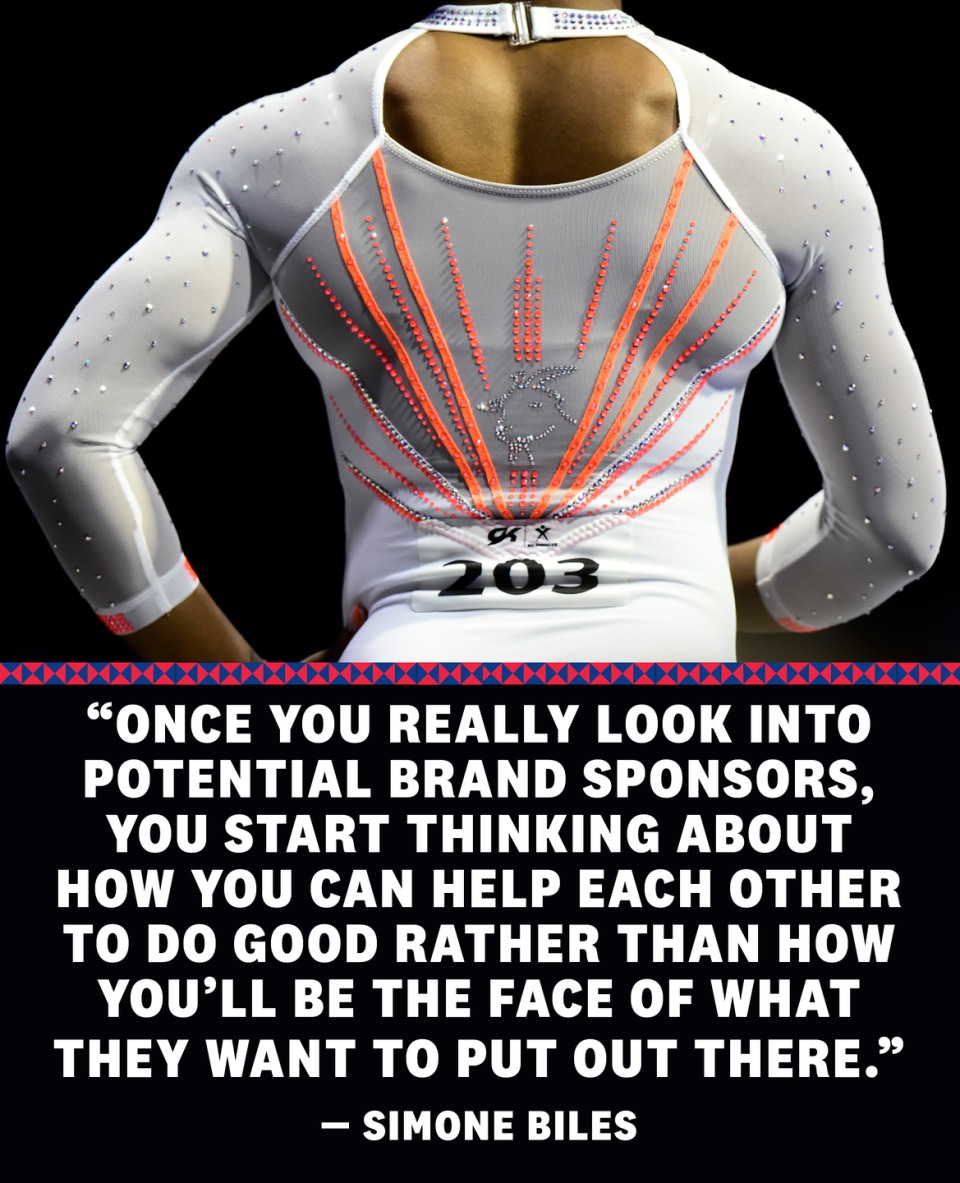
“I was so young. Partnering with Nike was one of my dreams, but when I got older, I started thinking more about what my passion projects were and how my sponsor was going to help me with those,” Biles told Women’s Health in an exclusive interview. Athleta, a younger, women-led company relatively new to the sponsorship scene, met the mark.
“I wanted to partner with a brand that would challenge me and recognize women and girls’ collective strength,” she says. “Athleta only has a few athletes so they can tune in with you on a personal level and I can get that one-on-one support. And when your goals and theirs align, you score.”
Seattle Storm forward Breanna Stewart stepped away from Nike this spring too, opting instead for a contract with Puma. Biles's and Stewart's sponsorship moves—which came two years after nine-time Olympic track and field medalist (and mother and activist) Allyson Felix also left Nike for Athleta to become their first sponsored athlete—were a crescendo in a movement that’s been building for years.
Female athletes are claiming the power position in sponsorships now, seeking out (and thereby demanding) brand partnerships that offer a chance to shine as a whole person, provide support for their health outside of performance metrics, allow them to pursue activism beyond sport, and function as more than a highlight reel with a pretty smile.
For athletes like Felix, the payoff has been swift: She just announced that, in partnership with Athleta and the Women's Sports Foundation, she's created a first-of-its-kind child care grant, called the Power of She Fund, for mom athletes, including those headed to Tokyo. She also launched her own shoe brand, Saysh, sporting the spikes during the Olympic trials. Stewart is currently developing her own signature shoe with Puma as well.
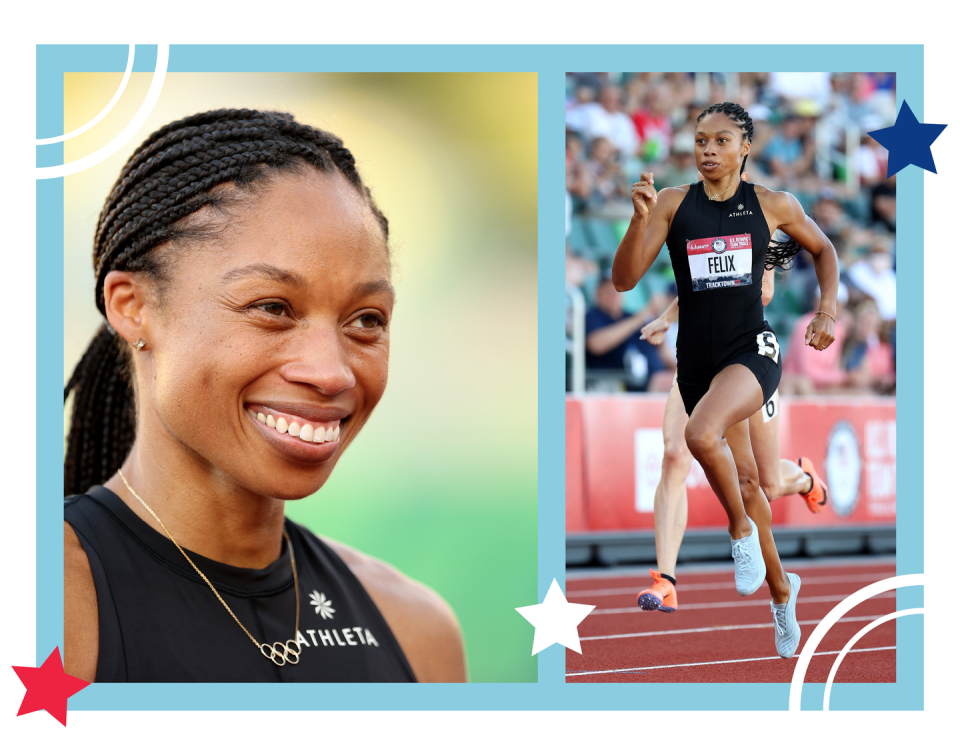
“This feels more like a revolution than an evolution.”
That's what Olga Harvey, chief strategy and impact officer at the Women’s Sports Foundation, a research-driven non-profit that’s been advocating for girls and women in sports for nearly 50 years, says of Biles' big move. “There are more companies than ever interested in telling the stories of female athletes, and investing both in women's sports leagues, as well as in individual female athletes. It's exciting to see the power of women's sports and female athletes being recognized," she adds. “Obviously, financial rewards are amazing, but you want to align with the companies that share your values.”
For Biles, that means using her social media platforms to share her vision and activism, rather than solely being a performer and marionette for her sponsor. And there appears to be a keeping-it-real easiness to her social media posts compared to years past, with more glimpses of her life off the mat, from trips with her boyfriend (Houston Texans safety Jonathan Owens) to updates on what she’s digging on Netflix (L.A.’s Finest and the Naomi Osaka documentary) to her love for fried pickles and her pups Lilo and Rambo. She’s also passionately outspoken about issues affecting women.

“As I’m getting older, I need to think about when I’m not doing sport and how I can help outside of the sport, outside of being an athlete,” she says. “In the gymnastics community, body positivity is a huge obstacle, and I want to have a positive impact on girls everywhere and relay a message of body positivity and believing in themselves, and I want my sponsor to reflect that too.”
For decades, men’s voices were the dominant ones in sports, which isn’t surprising given how male-dominated the industry has traditionally been (from league and team owners to coaches, media, and agents). But the chorus of female voices is now so loud, authentic, and real, that it can no longer be brushed off by brands. And this has given athletes—with their millions of fiercely loyal social media followers—the power to be picky about who they partner with.
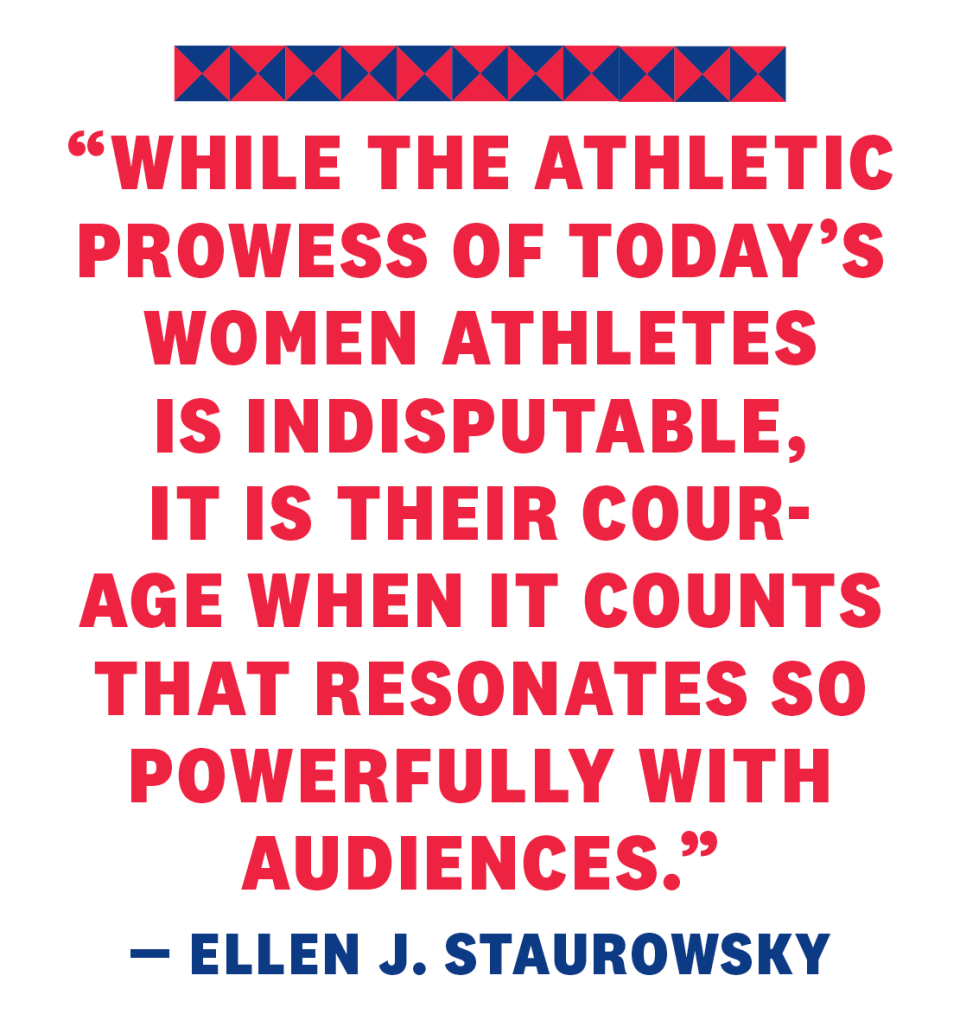
“Women athletes in this era have exhibited time and again tremendous integrity and character,” says Ellen J. Staurowsky, Ed.D., a sports media professor at Ithaca College. “Athletes like Simone Biles, Naomi Osaka, Serena Williams, Allyson Felix, Megan Rapinoe, Alex Morgan, Candace Parker, Chiney Ogwumike, as well as women’s teams and leagues, have demonstrated that they are so much more than athletes who have the potential to sell products."
Just look at the momentum created by the WNBA striking in light of police shootings, or how the US women’s national soccer team has fought for equal pay. "While their athletic prowess is indisputable, it is their courage when it counts that resonates so powerfully with audiences,” says Staurowsky.
This is a superpower that will of course prick the ears of marketers, but perhaps even more importantly it sets the athletes up for success after sports, as their own personal brands grow.
Reinventing sponsorships—one sport at a time
World champion runner Mary Cain was also thinking about life after athletics when she left Nike. In late 2019, shortly after her New York Times piece, I Was the Fastest Girl in America, Until I Joined Nike, caught national attention, the middle-distance runner—who in 2013 at age 17 was the youngest track and field athlete to make the world championships—sat down with her family and her boyfriend and told them she didn’t foresee a world in which she’d ever be given a traditional, professional sports sponsorship again. She’d used her voice to detail physical and mental abuse that led to extreme weight loss and bone fractures at the hands of Alberto Salazar, coach of the now-defunct Nike Oregon Project and one of the most prominent running coaches in the world (Salazar denied the allegations). And that was that, she thought. “I had called out not just the abuses of one company, but really the abuses of a system that lets athletes down and fails them,” says Cain.
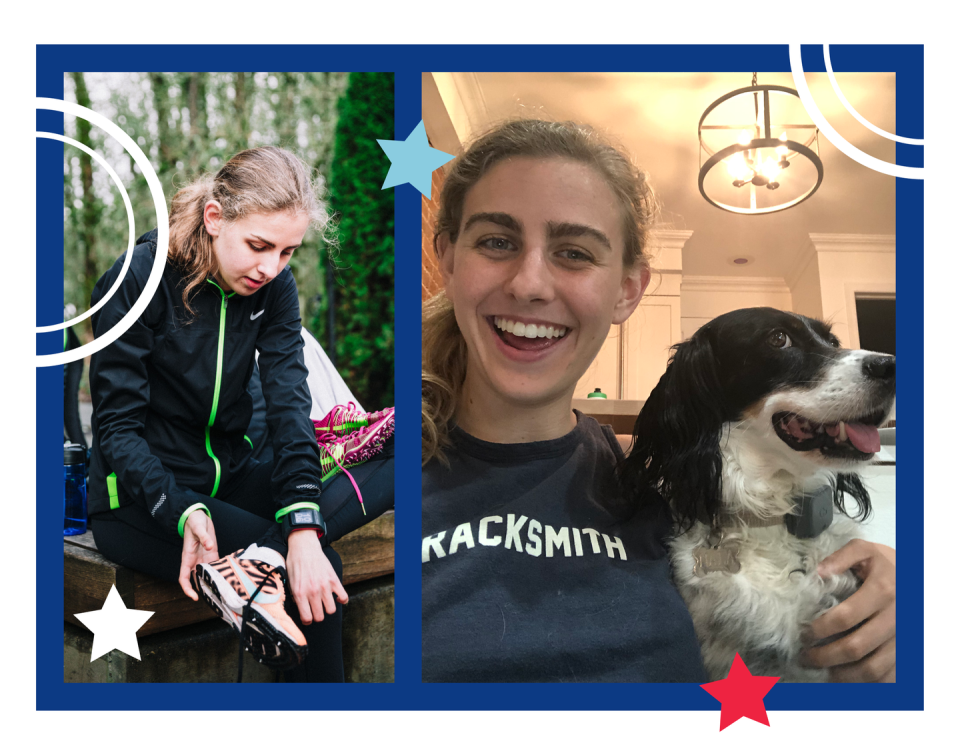
What Cain didn’t realize when she spoke up was that her bold honesty and passion for change could actually inspire how another brand chose to operate, helping to reinvent the sponsorship system that doesn't support athletes well, women in particular. Her story caught the attention of Matt Taylor, founder of running clothing brand Tracksmith. Taylor had been interested in bringing athletes on board but only if he could do it in an ethical way. He hired Cain, but not just to rock his brand’s clothing—he also gave her a salary, benefits, and a proper job title: New York City Community Manager, a role that has been focused on re-opening running meet-ups in New York City post-pandemic and curating their community newsletter materials.
And at the end of June, Cain announced that—with the support of Tracksmith, Nuun, Airbnb, and other private investors—she’s established a professional women’s running team called Atalanta New York City (“Atalanta” is one of the fastest mortals in Greek mythology). The team not only has access to the tools they need to pursue the highest level of sport—full-time coaching, access to recovery equipment, support on the track, travel and, of course, racing opportunities—but also working roles within Atalanta, opportunities to give back to the community by mentoring young girls in underserved parts of New York City, and all the benefits of being a true employee rather than just a contracted athlete.
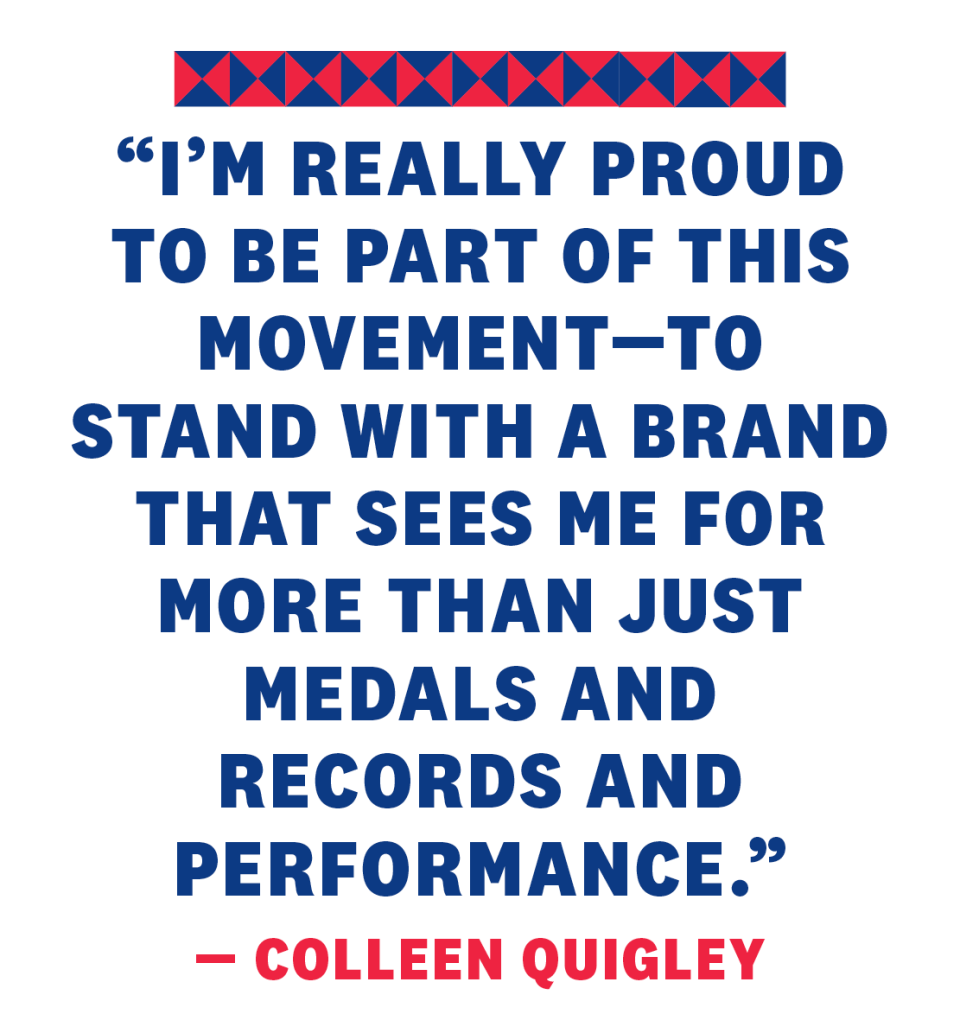
“It really flips the current model of professional running on its head,” Cain says. “Rather than having a few organizations sponsoring an athlete through independent contractor sponsorship deals, we’re a service-based non-profit. Every single professional runner on our team will be a true employee, just as I am at Tracksmith—with a salary, W2, tax paperwork, and health insurance. I know this model can really help create champions for life, and it's felt really special continuing to work to make sport a better place for everyone."
Cain hopes opportunities like these give athletes the tools they need to be successful when their professional running careers come to an end. It's something that, unfortunately, many traditional brand sponsorships can't offer athletes: support when they're no longer directly competing for the brand.
Seeking a partner in good—and hard—times
Being seen as more than a stat sheet was on Olympic track and field athlete Colleen Quigley’s mind when she left Nike last year. A couple of days later, untethered to any brand, she ran a race in Arizona, unsponsored. “I realized it was an opportunity to do something really cool,” says Quigley, who finished eighth in the 3000-meter steeplechase at the 2016 summer Olympics in Rio. “When do I ever get to choose someone, something, or an organization to put on my jersey?”
She found a local organization called Achieving My Purpose, which empowers young women of color to achieve their goals after high school. Quigley decided to rep the org on her race jersey and promote their cause on her social platforms. Her followers took notice and donated more than $7,000 to the non-profit. It wasn’t long before Lululemon came calling. They’d heard about Quigley’s performance, and were excited to see an athlete using a race as a platform to raise awareness and show their passion beyond their athletic goals.

“I talked to them for the first time, and I told my agent, let’s do this,” says Quigley. “They really see me as a whole human being and embrace what I do off the track. I love to cook, I love to do Pilates, and yoga, and swim, and bike, and hike. But I also like to be creative and write. There are just so many things I like to do off the track and I’m excited that they want to support me in all of that. I’ve never felt that before. I’ve always felt like just an athlete.”
Quigley was doing her first photoshoot with Lululemon in New York City when she got word that Biles was joining Athleta. “I was like, wow, this is a movement, this is really cool,” she says. “And I just felt really proud to be part of that—to stand with a brand that sees me for more than just medals and records and performance.”
Before the Olympic trails, Quigley issued an emotional statement saying she was pulling out due to injuries, that Lululemon indeed stood behind her, and that she couldn't imagine how much harder her decision to step back would have been if she was also in jeopardy of losing her funding.
“It's a relief that I can make the best decisions possible for me, my body, and my long-term success and longevity in the sport, instead of feeling pressured into making a decision for the short term that may risk my health down the road," says Quigley. "It also underlines how Lululemon truly values me beyond my athletic accomplishments. They don’t just say they care about their athletes, they show us how much they care about us as human beings.”
Headed into the Olympics this summer, bigger brands are likely taking a hard look at how they structure sponsorship deals, and how their traditional models need to evolve to meet athletes' needs—and keep them on their teams. That includes Nike, which just added seven WNBA players to its roster, along with US women’s national team star Rose Lavelle. They’ve also partnered with Naomi Osaka to create Play Academy, an initiative that uses sports to empower young, at-risk girls in Japan, Haiti, and Los Angeles.
“For decades, Nike has supported athletes in all corners of the world, across multiple sports and at every stage of their life,” the company said in a recent statement to Women’s Health. “That unique reach has given us the opportunity to continuously learn and evolve how we champion Her. Together, across the industry, we have more work to do to make sport more accessible and equitable for everyone. And we’re excited to explore new ways to celebrate athletes in more multi-dimensional ways to inspire more women and girls to experience the joy of sport. Just as we support our athletes in pursuing their goals, they push us to think even bigger about the change we can create together."
Harvey isn’t surprised to see brands re-evaluating their sponsorship strategies. “It's not about just on-court performance, but it's about the whole story of an athlete,” she says. “Whether it's their social justice causes or personal aspirations, brands really need to commit to change along with these athletes.”
"There seems to be a growing awareness among athletes across the board that they are the authors and protectors of their legacies," says Staurowsky. "This generation of athletes—female, male, and gender non-conformers and gender fluid—are making decisions that reflect a social consciousness and an understanding that their position in the world can serve as a platform to advocate for change."
For their part, Cain, Quigley, and Biles hope their stories will empower young female athletes to seek a sponsor that values their perspective and passions, and health beyond their physical performance.
“Once you really look into potential brand sponsors, you want to start thinking about, how can we help each other to do good rather than me being the face of what they want to put out there?" says Biles. "And it most definitely puts pressure on brands to listen to their athletes and what they want and need.”
You Might Also Like

